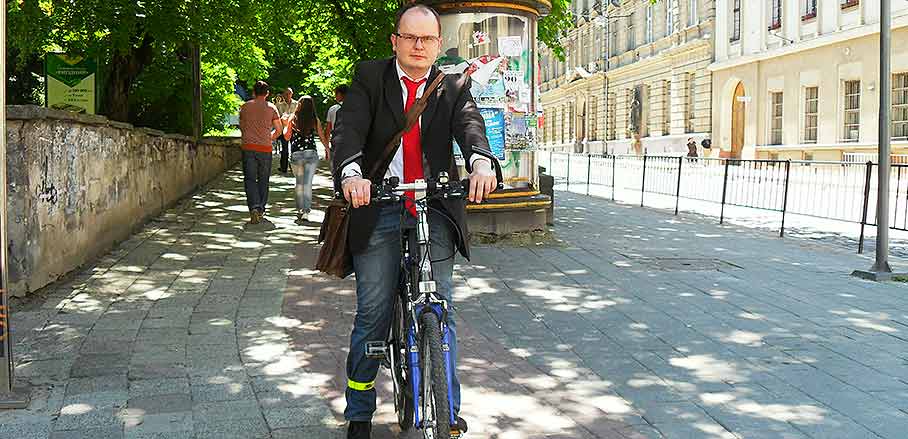Yuriy bikes to work. How sustainable mobility in Ukraine contributes to climate protection
By Mathias Merforth
Today, you can find Yuriy Didevych in the streets of Lviv, riding his bike in a suit and a tie. Because traffic in the city is “challenging” sometimes, Yuriy wears a helmet and tries to find the safest path through side streets, on sidewalks and on the city’s bike lanes that cover a distance of 70km by now. “When I wear a business suit, drivers treat me with much more respect”, says Yuriy.
Yuriy is a young man, a lawyer who belongs to the aspiring Ukrainian middle class. He could easily afford to buy a car, but he prefers to use his bike for the 3.5km ride to work. When asking him why he opts for cycling, he replies, “I savour the good, and at times heavy, Ukrainian cuisine. If I bike regularly, I can maintain my weight and can also concentrate better at work.” Not least, cycling saves half the amount of time it would take him by car, avoiding traffic jams. As a positive side-effect, Yuriy is saving around 350kg of CO2 per year.
Ukrainian cities are not laid out for mass motorisation. Once pedestrian-friendly cities with well-developed public transport systems, they are increasingly blocked by traffic jams today. Citizens and visitors are suffering from air pollution, while the little amount of public space that exists is crowded by privately owned motor vehicles.
The city of Lviv changed its path completely when it was preparing for the European Soccer Championship in 2012. Since then, it has focused on developing bike paths, banning motorised vehicles from the city centre, and improving public transport.
German development cooperation has been supporting Lviv since 2011 in taking its first steps in developing cycling infrastructure. Today, citizens have access to bike paths that stretch over 70km. 20 Ukrainian cities are now following Lviv’s example and are developing and implementing strategies for improved bicycle traffic. The city administration and civil society actors regularly pass on their experience to others at national and international meetings and conferences, hence improving the conditions for sustainable transport.
Recently, the country’s first public bike rental system was established in cooperation with German contractor nextbike.
